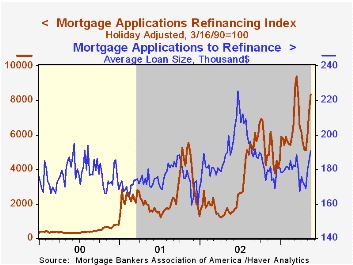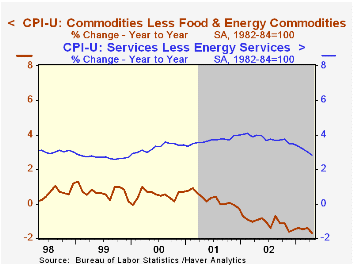 Global| May 21 2003
Global| May 21 2003Mortgage Applications Up, Refi's Surge
by:Tom Moeller
|in:Economy in Brief
Summary
The index of mortgage applications compiled by the Mortgage Bankers Association surged 10.2% last week, the third double digit rise in as many weeks. During the period mortgage applications have risen by nearly one half. Applications [...]

The index of mortgage applications compiled by the Mortgage Bankers Association surged 10.2% last week, the third double digit rise in as many weeks. During the period mortgage applications have risen by nearly one half.
Applications to refinance jumped 15.2% w/w and have risen 64.0% during the last three weeks. That left applications to refinance just 11% below the March peak.
Interest rates on a conventional 30-Year mortgage fell to a new low with the effective rate at 5.44% versus 5.55% the prior week and 6.13% averaged in December. The effective rate on a 15-year mortgage was 4.94% versus 5.55% averaged in December.
Applications for home purchase eased for the second week, falling 4.7% w/w. Because of a sharp rise in opening week of May, purchase applications so far in the month were up 9.6% from April.
During the last ten years there has been a 52% correlation between the y/y change in purchase applications and the change in new plus existing home sales.
The average size of a mortgage loan application rose for the third straight week to $193,100 (5.0% y/y). The average size of an application for home purchase rose to $201,200 (10.9% y/y). The average size of an application to refinance rose 3.1% to $190,500 (1.3% y/y).
The Mortgage Bankers Association surveys between 20 to 35 of the top lenders in the U.S. housing industry to derive its refinance, purchase and market indexes. The weekly survey accounts for more than 40% of all applications processed each week by mortgage lenders.
Visit the Mortgage Bankers Association site at www.mbaa.org.
| MBA Mortgage Applications (3/16/90=100) | 5/16/03 | 5/09/03 | 2002 | 2001 | 2000 |
|---|---|---|---|---|---|
| Total Market Index | 1,562.8 | 1,417.8 | 799.7 | 625.6 | 322.7 |
| Purchase | 395.8 | 415.2 | 354.7 | 304.9 | 302.7 |
| Refinancing | 8,351.1 | 7,250.0 | 3,388.0 | 2,491.0 | 438.8 |
by Tom Moeller May 21, 2003

Consumer prices for a broad range of goods have fallen sharply over the last two years. Since early 2001, the CPI for goods less food & energy has fallen 2.7%.
Price declines have been most notable for personal computers and apparel. Moderate declines also have been logged in the prices for home furnishings and motor vehicles.
Offsetting the deflation in the goods sector has been persistent inflation in the prices for services. Here too, however, the rate of inflation has fallen sharply. The y/y change in core service prices fell to 2.8% in April versus 3.8% for all of last year.
During the question and answer period of today's testimony before Congress, Fed Chairman Alan Greenspan mentioned the risk of an "unwelcome substantial fall in inflation," which he said was minor. For the prepared text delivered today by Chairman Greenspan click here.
| April | Peak | % Vs. Peak | 2002 | 2001 | |
|---|---|---|---|---|---|
| CPI Goods less Food & Energy (1982-84=100) | 141.7 | 145.6 | -2.7% | 143.7 | 145.3 |
| Household Furnishings & Operation | 126.9 | 129.2 | -1.8% | 128.3 | 129.1 |
| Apparel | 120.4 | 135.1 | -10.9% | 124.0 | 127.3 |
| New & Used Motor Vehicles | 97.6 | 101.9 | -4.2% | 99.2 | 101.3 |
| Personal Computers & Peripheral Equip. (NSA) | 18.7 | 100.0 | -81.3% | 22.2 | 29.5 |
| CPI Services less Energy | 222.1 | -- | -- | 217.5 | 209.6 |
Tom Moeller
AuthorMore in Author Profile »Prior to joining Haver Analytics in 2000, Mr. Moeller worked as the Economist at Chancellor Capital Management from 1985 to 1999. There, he developed comprehensive economic forecasts and interpreted economic data for equity and fixed income portfolio managers. Also at Chancellor, Mr. Moeller worked as an equity analyst and was responsible for researching and rating companies in the economically sensitive automobile and housing industries for investment in Chancellor’s equity portfolio. Prior to joining Chancellor, Mr. Moeller was an Economist at Citibank from 1979 to 1984. He also analyzed pricing behavior in the metals industry for the Council on Wage and Price Stability in Washington, D.C. In 1999, Mr. Moeller received the award for most accurate forecast from the Forecasters' Club of New York. From 1990 to 1992 he was President of the New York Association for Business Economists. Mr. Moeller earned an M.B.A. in Finance from Fordham University, where he graduated in 1987. He holds a Bachelor of Arts in Economics from George Washington University.
More Economy in Brief
 Global| Feb 05 2026
Global| Feb 05 2026Charts of the Week: Balanced Policy, Resilient Data and AI Narratives
by:Andrew Cates






